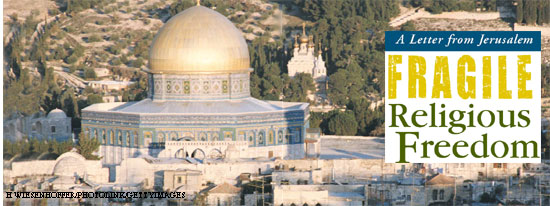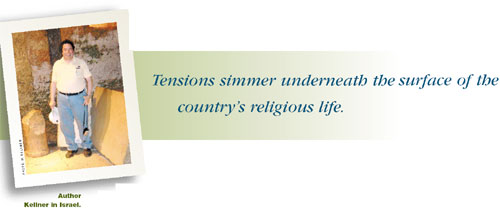Fragile Religious Freedom
Mark A. Kellner January/February 2005
Getting your Trinity Audio player ready...

Jerusalem. It is refreshing – yet unsettling – to be a Sabbathkeeper in the capital of Israel, clearly one of the most Sabbath-observant nations on earth. As these words are written, I'm wrapping up a week in the land that is sacred to Judaism, Christianity, and Islam. Although my main assignment was to see and write about religious tourism possibilities, of which there are many, I also picked up on several contrasting and interesting religious liberty tensions in this still-young country, just 57 years old.
It's certainly impressive to see a city essentially shut down on Friday evening, if not before. As the sun slipped down toward the western horizon, shoppers (myself included) scurried to a local grocery store to get last-minute provisions. As I left, a security guard at the front door (almost all Israeli businesses of any size, and all hotels, have such guards) waved off another customer, saying the store was closing.
At about 7:00 p.m. Friday night, while sitting in a small worship service, I heard a loud siren. "Do you know what that is?" my host asked. "The signal that the Sabbath has officially begun?" I ventured, and I was right.
Back at my hotel the "automatic" Sabbath elevator had begun running. In this lift no buttons need to be pressed (a task considered work by highly observant Jews) to select a floor. Instead, the lift takes its passengers from the lobby to the top and then starts working its way down, pausing at each floor with the doors open for about 90 seconds, to allow folks on and off. The technology is fascinating, unless you're a less ultraobservant Sabbathkeeper and perhaps need to get to your room faster. For those people – and others – there are regular elevators.
Such dichotomies extend to many aspects of life in Israel, which has long advertised itself as the "Jewish State," even if many of its Jews are essentially secular (a legacy of Israel's socialist founders), and even if one quarter of its citizens, or about 1.6 million people, are Arabs, more than 90 percent of them Muslim, who enjoy the full rights of citizenship, including religious freedom. (There are, after all, quite a few more mosques in Tel Aviv than there are Christian churches in Saudi Arabia.) Outside my hotel on Sabbath morning, I found a taxi driver anxious to have my business. When I told him I had only a short stroll to the worship service I would attend (I called it "an appointment" to avoid debate), he asked if I wouldn't want to see some of the sights nonetheless.
Sunday, as I discovered on landing here, is a normal business day in Israel. Employees are expected to show up at work; school is in session; government agencies and banks happily transact business on the first day of the week. That could cause problems for dedicated Sundaykeeping Christian employees who wish to worship on that day. A businessman who closes on Sunday, just as with a Muslim shop owner who shutters his store on Friday (though few in the Old City of Jerusalem seemed to do so), will send a signal to his neighbors that might endanger business. As to the bravery of those opening on Saturday, I can't report, since I rested that day. However, there are stories of discotheques and restaurants open on Friday night, particularly in Tel Aviv, the nation's commercial capital.

One of my hosts, who, like others in this article, will remain nameless to spare them any problems, was married in a "traditional" Jewish ceremony, performed by an orthodox rabbi. Next month, however, my Israeli friend and their spouse will go to Turkey for the wedding of another pair of friends.
This isn't because they have a desire to travel, even if Israelis insist that they are the world's most prolific tourists. Rather, it's because once one is married in a religious ceremony in Israel–the only kind allowed–one has to obtain a religious divorce before remarrying. For Jewish women, such a divorce, called a get, can be issued only with the husband's permission. If it's not granted, the woman remains in legal limbo, sometimes for years.
Israel's government has struggled for years with a form of civil marriage that is already common and widely accepted in the United States, Canada, Britain, and many other nations: a trip to the city clerk's office for a marriage license and, presto, you're married. Ending such unions can be done at the courthouse, or by proxy if you're Britney Spears at the end of a 50-hour marriage in Las Vegas.
Such easy outs aren't to be found here, unless you have a civil marriage from abroad, hence the boom in Turkish marriages and marriages elsewhere. The strictures on marriage are pleasing to the Orthodox Jewish community, which believes its brand of fervency is the only correct one. But if you're not Orthodox–or if you are and you really, really want out of a bad relationship–limbo becomes not just a party dance but also a state of existence.
Christians, though certainly free to worship, have their own difficulties in Israel. Many churches are allowed to operate, but getting visas for overseas workers or volunteers has been tricky at times. In the second half of 2003 there was a clampdown on such visas, and it required the intervention of several members of the Knesset, Israel's parliament, to change things. The restrictions were understandable, but as one expatriate evangelical Christian told me, "We have no standing here." Yet another paradox emerges!
On the one hand, many evangelicals are fervent in their desire to support Israel, and a Zionist Israel at that. They raise money for Israel's poor, its new immigrants from the former Soviet Union and other nations, and they bring Christian tourists and conventions here. American evangelical (and onetime presidential candidate) the Reverend Pat Robertson was to headline a "Feast of Tabernacles" assembly of 4,000 Christians from around the world in fall 2004.
Israel, which has been shunned by many of its former friends in Europe (even, ironically, the countries that felt deserved shame over their treatment of Jewish populations during the Nazi Holocaust), not to mention by many so-called mainline Christian churches (the Presbyterian Church U.S.A. has voted to "divest" its stock holdings of companies that do business with Israel, a move sharply criticized by many within its ranks and beyond), is happy to have the friendship of other Christian believers.
Yet Israel's leaders–again, largely secular in outlook–seem to be nervously glancing over their shoulder in two directions. In one corner are the ultra-Orthodox, whose patronage and coalition support in parliament are usually vital for either a Labor or Likud government. These parties, and the constituencies they represent, want to keep Israel as close to traditional Jewish practices as possible. Liberalizing Jewish religious practices, such as marriage rules, would bring down their wrath; allowing active Christian evangelism might well touch off a political apocalypse.
In the other corner is the bitter memory of a Jewish society in Europe that saw assimilation with the dominant cultures of France, Germany, Austria, and other lands as the highest goal. Such assimilation, many argue, led to disbelief in Zionism and ignorance of the warning signs of Hitler's rise and his evil plans.
Such pressures restrict the abilities of Christians in the land to breathe as freely as they might wish. A man standing on Ben Yehuda Street in Jerusalem offering an alfresco sermon about Yeshua (the Jewish name for Jesus) will likely find an Orthodox woman standing in front of him with a black handkerchief raised to block his face.
The Jerusalem Post, Israel's oldest English-language daily, and one of its most conservative, offers numerous examples of the dichotomies encountered in Israel's religious culture: One day the paper assails government leaders for foot-dragging on civil marriage, stating that hundreds of thousands of Israelis are in marital limbo. Then, in the paper's weekly In Jerusalem supplement, the cover story details a supposedly "illegal" missionary outreach to Jewish young people. Called The Jamm, the group, run by a former Jerusalem police detective who is a proud "Jewish believer in Yeshua," offers music lessons and practice sessions to establish friendships with teenagers. According to critics, the missionaries then swoop in and try to pressure teens into conversion to messianic Jewish faith, something that is anathema to most Israelis. One 15-year-old, who went to the center in part to cope with his parents' divorce, said he was pressured to be baptized, despite a law forbidding the evangelization of minors.
The messianic former detective contends– and local police confirmed–that no youngster is offered religious information without their parents' consent. So-called antimissionary organizations want local law officers to dig deeper.
Here's the irony, however: A few pages over from the article attacking Christian monotheists for reaching out to Jewish monotheists to believe in a Jewish messiah named Yeshua, the same newspaper that decried–in a news story, no less–such efforts printed announcements for yoga and meditation practices, despite the lack of any evidence that the Israelites practiced Kapotasana, or the Pigeon Pose, while en route to the Promised Land during their 40 years in the desert.
It's easy to dismiss such contradictions as a form of societal schizophrenia, but that would sell short what truly may be at work here. A young nation born and reared in military conflict and surrounded by hostile enemies is growing up, and finding its way. The age of 56 might not seem like a time of adolescence, but when it comes to religious freedom, it might well be. Those who love Israel and want to see it thrive can only hope the choices its people and leaders make will be sound ones that bring credit to a land that has accomplished so much, and so quickly.
___________________________
Mark A. Kellner is a freelance writer in Rockville, Maryland, and a columnist for The Washington Times daily newspaper.
___________________________